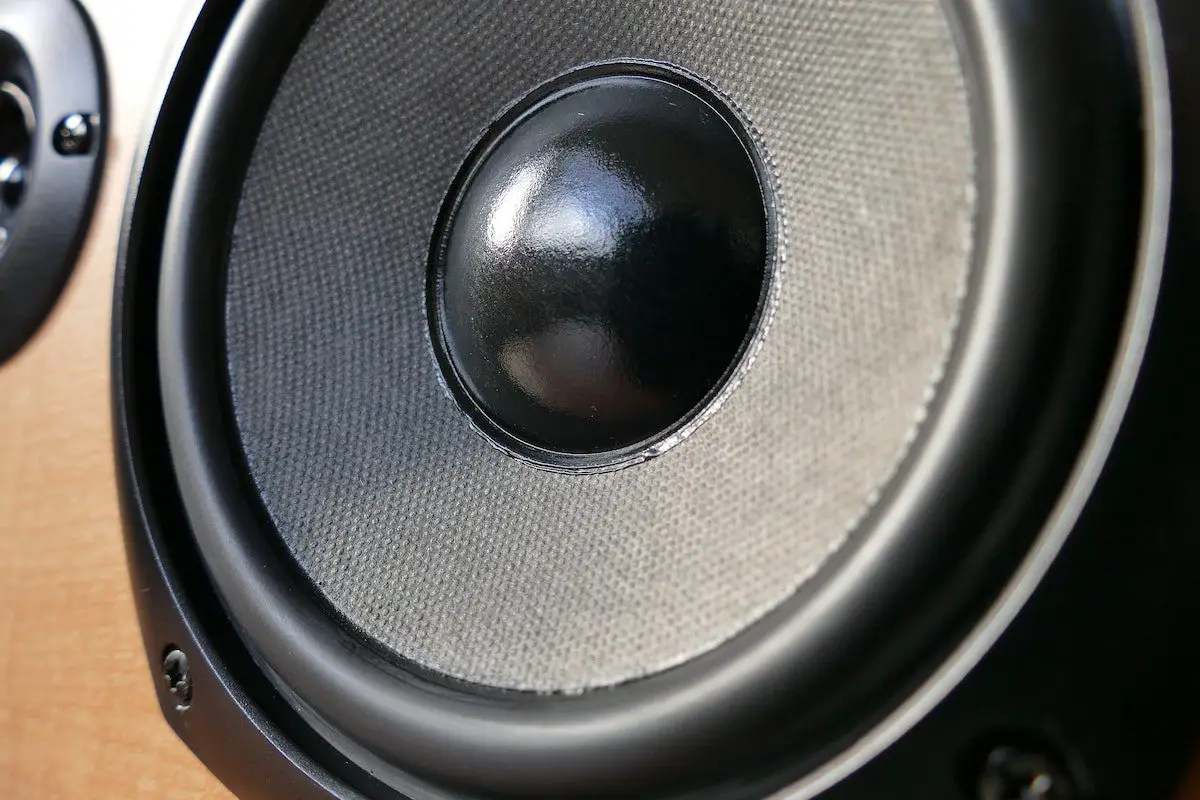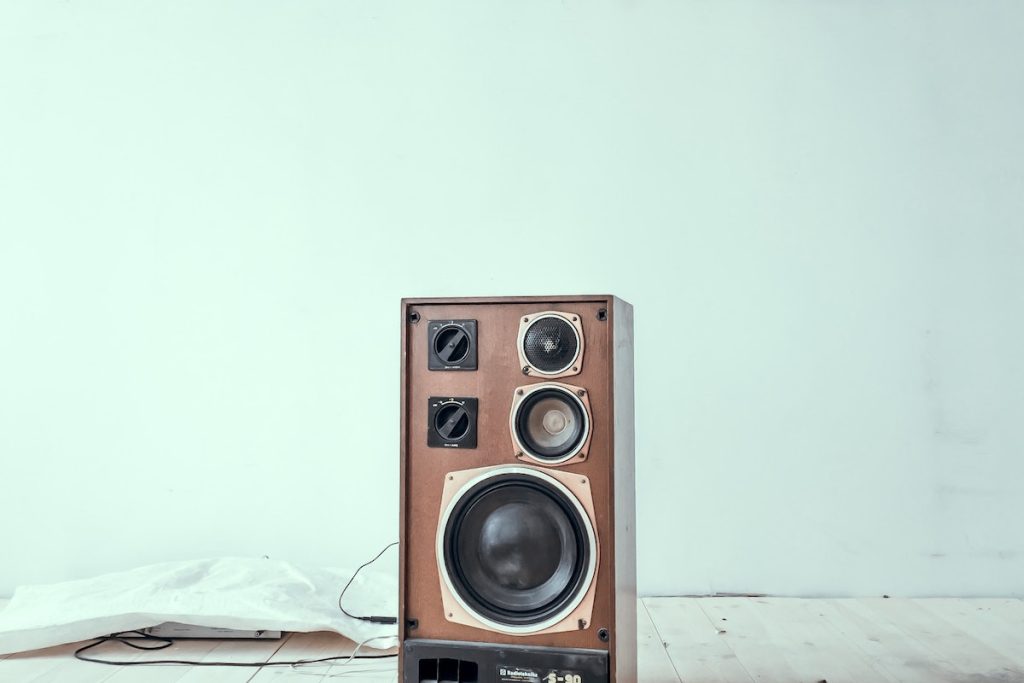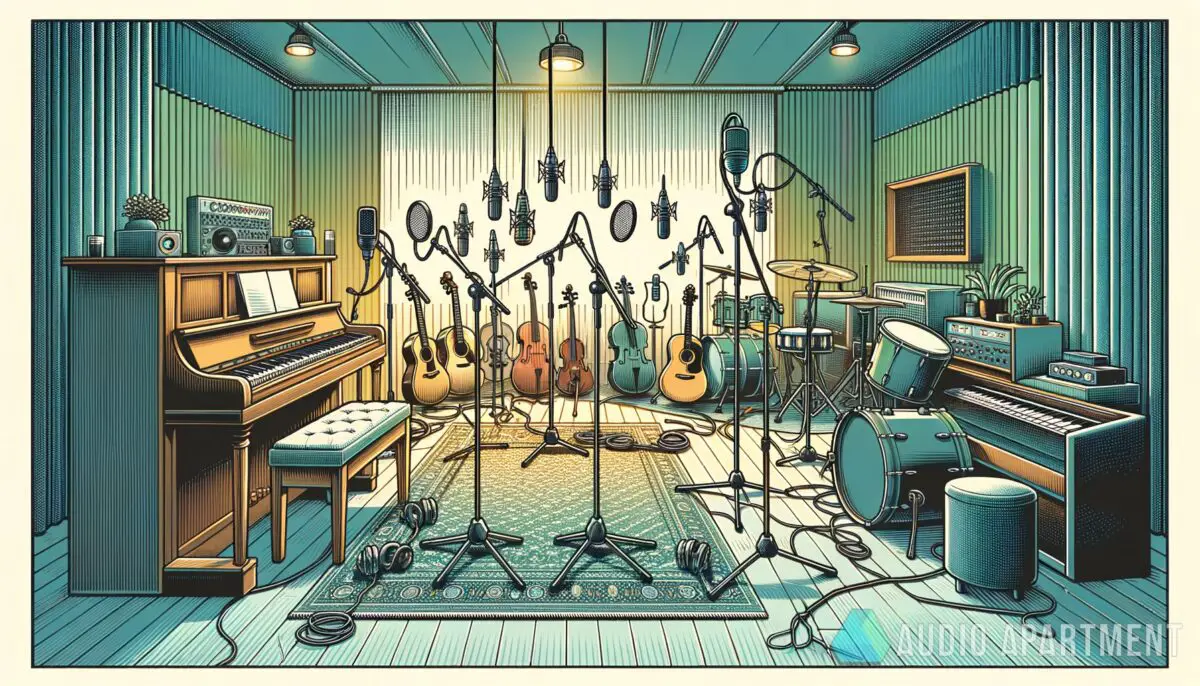With its ability to transform electrical signals into captivating sound waves, a loudspeaker breathes life into music, speech, and sound effects. But what exactly is a loudspeaker, and how does it work? We’ll answer these questions for you, and by the end of this blog post, you’ll learn how they bring music and sound to a vibrant existence.
What is a loudspeaker? A loudspeaker is a device that converts electrical signals into sound waves. It is commonly used to amplify and reproduce audio in various settings, such as music playback, public address systems, and home theater setups.
How do loudspeakers work?
Loudspeakers work by converting electrical signals into sound waves that we can hear. This magic happens through a process called electroacoustic transduction. It’s like an electric-to-acoustic converter that brings your tunes to life. They consist of several key components: a cone or diaphragm, a voice coil, a magnet, and a frame.

Here’s a quick breakdown of how it works:
- The electrical audio signals flow into the speaker and reach the voice coil, which is wrapped around a cylindrical structure called the former.
- When the electrical current flows through the voice coil, it generates a magnetic field that interacts with the permanent magnet in the speaker.
- This interaction causes the voice coil and the attached diaphragm (often made of paper, plastic, or metal) to move back and forth.
- The diaphragm’s movement pushes the air, creating sound waves that travel to your ears.
Imagine you’re listening to a smooth jazz track. The low-frequency sounds, like the bass guitar, are produced by the woofer, while the midrange driver handles the saxophone and the piano. The tweeter takes care of those silky high-frequency notes, like the delicate tap of a cymbal. Each driver works together in harmony to bring you an accurate and enjoyable listening experience.
AKAI Professional MPK Mini MK3

AKAI Professional MPK Mini MK3
What are the different types of loudspeakers?
Loudspeakers come in all shapes and sizes, each designed to fit specific audio needs. When it comes to choosing the right one, it’s essential to understand the various types of loudspeakers and their applications. Let’s dive into some popular types:
- Dynamic loudspeakers: These are the most common type of loudspeakers, using a cone-shaped diaphragm and an electrodynamic driver to produce sound. They’re versatile and can be found in home audio systems, portable speakers, and even car audio.
- Planar magnetic loudspeakers: These speakers use a thin, flat diaphragm with a wire or foil pattern to produce sound. They’re known for their accuracy and minimal sound distortion, making them popular among audiophiles.
- Electrostatic loudspeaker: Instead of using a traditional cone, these speakers have a thin, flat diaphragm sandwiched between two stators. They’re loved for their exceptional clarity and detail but can be more expensive and delicate compared to other types.
- Horn loudspeakers: These speakers use a horn-shaped structure to amplify sound waves, making them highly efficient and capable of delivering high volumes with minimal distortion. They’re often used in large venues like concert halls and movie theaters.
- Subwoofers: These specialized loudspeakers are designed to handle low-frequency sounds (bass). They’re perfect for enhancing the depth and impact of your audio system, whether it’s for home theater or music production.
How can you choose the best loudspeaker for your setup?
Choosing the best loudspeaker for your setup depends on several factors, including your listening preferences, budget, and the intended use of the speakers. Here are some key points to consider when making your choice:

- Purpose: Are you looking for speakers for a home theater, music production, or general listening? Different loudspeakers excel in specific areas, so pinpointing your primary use will help guide your decision.
- Size and space: Consider the size of your listening area and how much space you have for your speakers. Larger speakers may provide more powerful sound, but they also require more space. Conversely, smaller speakers can fit in tighter spaces but might not deliver the same audio impact.
- Frequency range: Depending on your listening preferences, you may want speakers with a wider frequency range to accurately reproduce all the nuances of your favorite tunes. Some speakers excel in high frequencies, while others shine in the low-end spectrum.
- Budget: Loudspeakers can range from budget-friendly to high-end audiophile models, so set a budget and find the best speakers within that range.
- Compatibility: Make sure your chosen speakers are compatible with your existing audio equipment. Check the power requirements, impedance, and connection types to ensure seamless integration into your setup.
If you’re looking for studio monitors to mix and master your tracks, you’ll want speakers with a flat frequency response for accurate sound reproduction. You might also consider the size of your studio and opt for near-field monitors if space is limited.
Advantages and disadvantages of loudspeakers
As we dive deeper into the world of loudspeakers, it’s essential to grasp the benefits and drawbacks these devices bring. This balanced perspective will help you make informed decisions whether you’re purchasing a new audio system or merely satiating your curiosity.
Advantages of loudspeakers
Let’s start on a high note and explore the advantages that loudspeakers bring to our auditory experience:
- Broad Sound Dispersion: Loudspeakers are designed to send sound out in all directions, ensuring you can enjoy music or sound effects from any point in the room.
- Variety: Many loudspeaker types and designs are available, catering to different audio needs, from home theaters to concert venues.
- Enhanced Sound Quality: Quality loudspeakers can deliver crystal clear, rich, and immersive sound, significantly improving the listening experience.
- Customization: Depending on the design, some loudspeakers allow you to adjust elements like bass and treble to tailor the sound to your preferences.
Disadvantages of loudspeakers
However, it’s not all smooth sailing. Let’s explore some potential pitfalls that come with loudspeakers:
- Space Constraints: Larger loudspeakers can take up considerable room, which might be a disadvantage in smaller living spaces.
- Power Consumption: Some loudspeakers, particularly those designed for high-quality output, can consume a significant amount of power.
- Sound Distortion: At high volumes, some loudspeakers may distort sound, reducing the quality of the audio.
- Cost: High-end loudspeakers can be pricey, potentially placing them out of reach for those on a tighter budget.
If you want even more tips and insights, watch this video called “Loudspeaker Basics in Under Ten Minutes!” from the Alpha Sound YouTube channel.
Frequently asked questions (FAQ)
Do you still have questions about loudspeakers? Below are some of the most commonly asked questions.
Can I use any loudspeaker for my home theater system?
While you can technically use any loudspeaker for your home theater system, it’s best to choose speakers specifically designed for that purpose. Home theater speakers are designed to handle the dynamic range of movie soundtracks and provide an immersive audio experience.
Is it necessary to match the brand of my loudspeakers with my audio equipment?
While matching the brand of your loudspeakers with your audio equipment isn’t a strict requirement, it can ensure better compatibility and a more consistent sound signature. However, many audiophiles and audio enthusiasts mix and match brands based on their preferences and the performance of individual components.
How can I maintain and prolong the life of my loudspeakers?
To prolong the life of your loudspeakers, follow these tips: keep them clean and dust-free, avoid exposing them to extreme temperatures or humidity, protect them from direct sunlight, don’t overdrive them (avoid playing at excessive volumes), and ensure they are placed on a stable, vibration-free surface. Regular maintenance and care will help your speakers perform at their best for years to come.
Conclusion
Well, folks, it’s time to wrap things up. Do you have a favorite type of loudspeaker? And did I cover everything you wanted to know? Let me know in the comments section below. I read and reply to every comment. If you found this article helpful, share it with a friend, and check out my full blog for more tips and tricks on music production and audio gear. Thanks for reading, and keep those beats bumpin’!
Key takeaways
This article covered the fascinating world of loudspeakers. Here are some key takeaways:
- Loudspeakers are electroacoustic transducers that convert electrical audio signals into sound waves.
- They work by using drivers, such as woofers, midrange drivers, and tweeters, to produce different frequency ranges.
- There are various types of loudspeakers, including dynamic, planar magnetic, electrostatic, horn, and subwoofers.
- To choose the best loudspeaker for your setup, consider factors like purpose, size and space, frequency range, budget, and compatibility.















